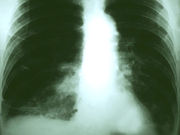Too few may be getting procedure, research suggests
TUESDAY, June 21, 2016 (HealthDay News) — Many patients with advanced stage non-small-cell lung cancer (NSCLC) might live longer if treated surgically, but few patients are actually undergoing surgery, according to a study published online June 9 in the Annals of Thoracic Surgery.
Elizabeth David, M.D., an assistant professor of surgery at the University of California’s Davis Medical Center in Sacramento, and colleagues analyzed California Cancer Registry data on 34,016 residents with stage IIIA, IIIB, and IV NSCLC between 2004 and 2012.
The researchers found that the 11 percent who underwent surgery, either alone or alongside additional treatments, experienced survival benefits of up to several years. The 27 percent who received no treatment had an average survival rate of just two months. About 20 percent of the patients received chemotherapy only and survived an average of 11 months. One-quarter underwent combination chemo/radiation therapy, which was associated with a survival rate of 12 months. Radiation alone was tied to a four-month survival rate. Patients treated with both chemotherapy and surgery saw survival rates approaching 41 months. Survival associated with chemo, radiation, and surgery was found to be in excess of 33 months, while surgery alone resulted in a nearly 29-month survival. Radiation plus surgery led to a survival rate approaching 19 months.
David told HealthDay that it’s critical that patients and doctors “understand that survival is different with each treatment regimen” so they can opt for the most beneficial option available.
Copyright © 2016 HealthDay. All rights reserved.








